Updates From Ethiopia: Days 1-9
- Amy
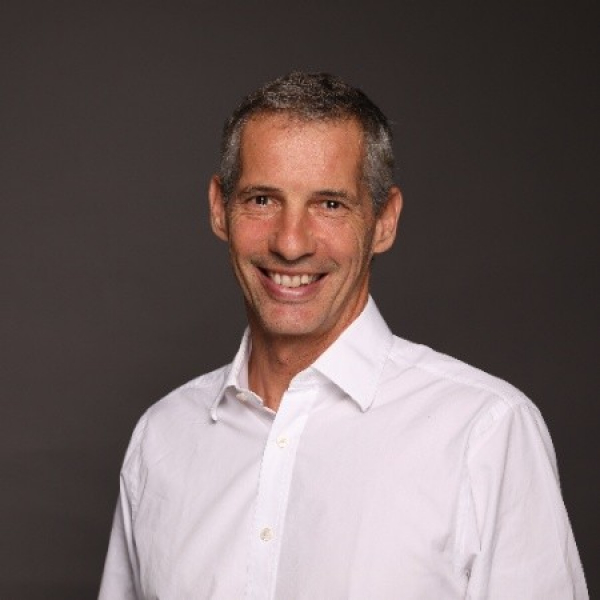
- Nov 13, 2019
- 8 min read
Updated: Nov 18, 2019
Some updates from my adventures so far, transmitted by SMS as there is no internet to be found! I will upload some more pictures when I can, but in the meantime you can find some on the Facebook page of the GoStar project.
Day 1
Our first day already brought some challenges to our planned schedule. Due to some uprising and violence, we were forced to take an inland flight to Awasa. We were the only plane on the tarmac at the airport. The bikes went via trucks and needed 12 hours just to pass all the checkpoints.
Day 2
The first stage and a long day of cycling. 126kms of uphill road cycling, all above 2000m and in 35 degree heat. Now we are on the road we have had 8 armed guards join us. They look well trained!

We ride in 3 groups: the Leopards, the Antelopes and the Giraffes. Mika, Pele and I lead the Leopards for the slipstream. There are 8 of us in total.
Our full convoy is 2 jeeps with 4 armed guards apiece (one up front and one behind), the peloton, 3 buses, two trucks for bicycles and the Landcruiser with the kitchen supplies. The Landcruiser sets off first to set up the camp for the much needed lunch.
As we enter villages the front Jeep blocks the street and the guards pile off to make sure the situation is under control. Then we cycle through, to cheers and kids running alongside us. Most think we are Chinese and shout "Ni how" in greeting. Two of the villages we passed through threw stones at us, and there are also some unpredictable individuals along the way with machetes that we keep a clear distance from.
Day 3
Today we climb up to 2400m, with Pele setting a good pace. Lots of exhaust fumes from trucks make the ride harder but we feel like the attraction of the year as we pass through each town.
Day 4
We descend to 1200m, before climbing 2000m up to 3200m where we camp for the night. I feel the first day's distance!
The landscape is unbelievable, endless lakes, trees and fields. In 50kms you only pass one village which makes you wonder where the 120 million Ethiopians are, especially as we are on one of the two main streets crossing the country. There is a north to south and east to west route, with dirt roads in between the major cities. That's it, and all for a country 3 times the size of Germany!
After climbing 1000m, we decide to load the bikes onto the trucks and do the rest by bus. Most of us are exhausted. We climb up on to the roofs of the buses and drive up dirtroads for 3 hours to lunch, which at 4pm, is now more of an afternoon tea. I got an upgrade on the roof of the bus and some canvas to lean back on, beats a first class upgrade with Swiss!
Pele does an incredible job of planning and organizing. Multiple buses, trucks, groups, food supplies, and every hour the circumstances change: be it ensuring safety in villages or rivers getting too high to pass.
We unload and travel another 25km downhill, ending at a local market. What an appearance the GoStar team makes - if Aliens would have landed at the same time no one would have noticed them! Huge crowds run behind us as we head down a single trail to our night camp.
The night finishes off with a great party and lots of singing and dancing. We have a talented singer in our group, Bettina, and the locals bring their own dances and chants. We finish the night in Jurassien style with "Franche Montagne".
Day 5
The schedule eases up, with only 40kms needed to reach the next lake, which we take small boats across. Tourism has not hit this area, a couple of 4x4s a day is all they see. The boat ride is fantastic, we see hippos and 3 huge crocs, and enjoy the pure nature with no buildings in sight.
After the lake it's back to the lodge where we all get a much needed massage after 3 big days on the bikes! But I am happy to feel my form building up. The usual unlucky 50% of the group has been hit with diarrhoea but I have managed to escape so far. It's still scary, if I fall ill or break something, there is no immediate treatment possible. Instead I'd be facing an airlift back to Switzerland for $20k! So no experiments.
Day 6
Nighttime brings huge thunderstorms I've never seen the like of! So much torrential rain and thunder I was worried we would slip away in a landslide. We set off on our 90kms and after two hours the rain returns, leading to a dirt-fight on the roads. When it dries up, Mica and I set the pace and we arrive too early for lunch. A quick sandwich and we hit the road again.
We pass tribes with Oxen and wooden ploughs as if we were ages back. Then uphill climb to Konso village, a UNESCO World Heritage site and amazing stone walled town. They have 9 districts with leaders and a very well organized society, somehow reminding me of the US constitution.
Since aid has arrived, health epidemics have ceased and the population of Konso village has swelled to 800,000, leading to problems with over population.
Livestock is kept in the house or inner yard to safeguard it from wild animals. This means the people share quarters with their cows, goats, sheep and chickens.
We hear that the women are usually the leaders of the blood line due to promiscuity. Rape is seen as the worst crime and is punishable by being buried alive. All boys sleep in a watched dorm for 7 years. The women are in charge, and each generation leads for 18 years before handing over power to the next.
Worth a Google: Konso Village
Day 8
We start the day by visiting a Karo tribe village. Again, women are the boss and men can partner with several. Their necks show scars from ritual whipping customs, and a sort of beauty symbol.
After that we set off to Omo river where crocodiles and malaria are on a roll! The last 17km is through mud and tough as a result. We pass termite hills and Savannah-esque landscapes.
When we arrive at the Omo river, the beach is full of crocodiles and our campsite is 40m up the river bank! We take our guides' words for it that they don't come out.
Then off to meet with the Hamar tribe, which was very unique again, with lots of jewelry and face and bodypaint. We are the only tourists and the spot is the nicest view I have seen in my life. Above the river and surrounded by hundreds of kilometres of untouched nature. No houses, nothing.

The Hamar men get into a dance as the wives prepare dinner. Each round of chanting gets more agitated and we hear it is also to find out who sleeps with who this night. In the evening wine is flowing and more dancing ensues. We shine our flashlights towards the river and see the crocodile eyes reflect. We count twenty on our beach. Patrick and I head to the tent.
Once settled down the guards connect the Bluetooth of the Jeep with the car stereo and the noise blasts us out of the tent. So I go out in my underpants and yell at them to cut it out. Only back in the tent I realize that this might have not been my best idea: confronting drunk guards with Kalaschnikows near a crocodile-infested river!
Day 9
The river is too high and we need to head back by truck and a detour over a bridge. Our bus gets stuck in a riverbed but some wood under the tires gets it out.
We arrive at out night camp which is complete with bed and shower! And welcomed after the camping. Now time to get back on the bikes, 75km on paved road to the Darachi tribe. Also the route involves a slight descent we also have 47 degrees and a lot of headwind to deal with. I organize a group to ride in slipstream and do lots of leading. At the end we got an average pf 27km/h on our mountain bikes!
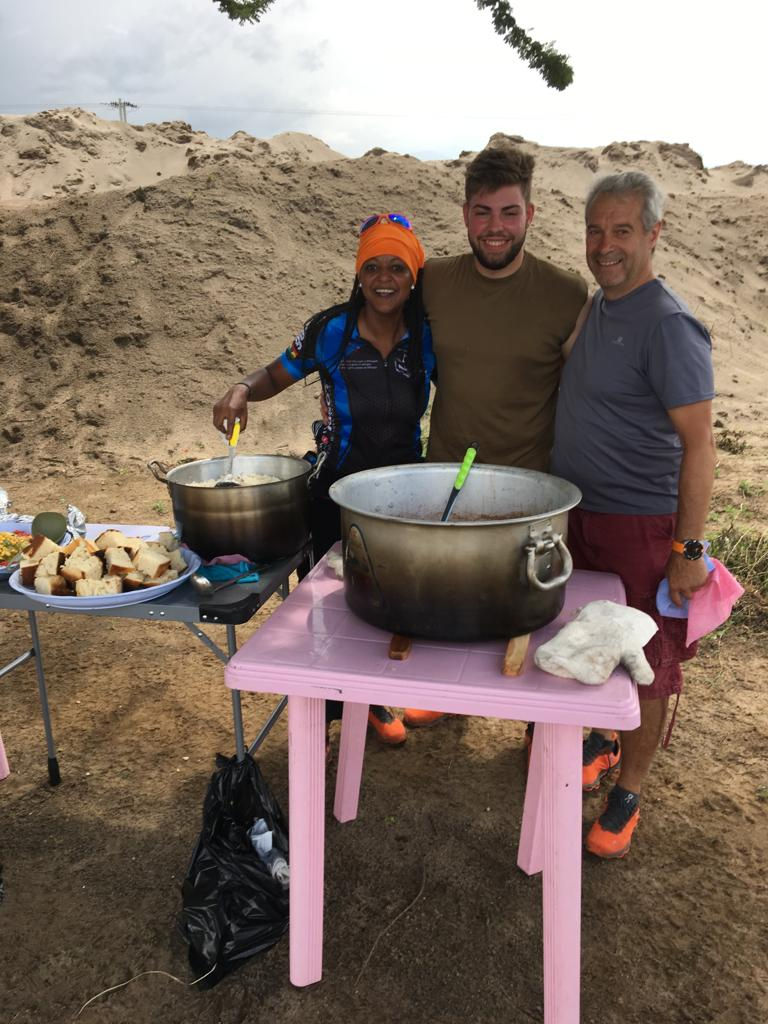
Mika, Stephan and I have to repair a tyre which puts 15 minutes between us and the front of the group. We catch up by doing short rotations and pushing like crazy. We average a 44km/h for half an hour and catch the rest as they stop for a bottle refill.
We arrive overheated at the destination and cool down in the local bar. We then need to climb into a canoe - a tree carved out with an axe - and set out on a river again. Our hosts are the Darachi tribe, a nomadic tribe close to Kenya border.
Armed conflict is common here between the nomadic tribes and local farmers over land claims. Our guards get nervous and spread out to secure the area. Most of the men carry guns. The Darachi tribe are extremely tall. The huts are shabby and there is a lot of dust and dirt. The guide explains that they circumcise all girls around 14-16. The men are working up the river delta with cattle for feeding and hunting crocodiles for 4 months at a time. We take some pictures, babies lying in the dust, people with one eye, one arm, coughing kids with big bellies. We set back over the river and are happy to not live like this. The atmosphere is very different, and the places we visited before seemed more peaceful and tidy.
Lets look at the dark side of Africa:
Female circumcision happens a lot. There is no clean knife, instead done with glass shards by female shaman. This brutal method is supposed to quell promiscuity by crippling female organs so they cant have sex. I spare you the details. If they do not follow the rituals they get expelled from the tribe and die. Woman or man. If you want to change the practice you need to find new roles for the shaman women, as today they have lots of power.
The medical practices can also be life threatening. Dirt and herbs is rubbed into cuts so ghosts can escape. Crocodile bites and shotgun wounds also contribute to the very high mortality rate. There are many incidences which we in Switzerland never hear of. We hear that last year at the Sudan border another tribe came over and killed 300 people and took 150 kids to sell them on the slave market in Sudan. Slavery is still present amongst tribes, one slaving the weaker one.
The highlight is to see lots of schools. The Konso tribe started with one school and now they have 41. Many kids speak English.
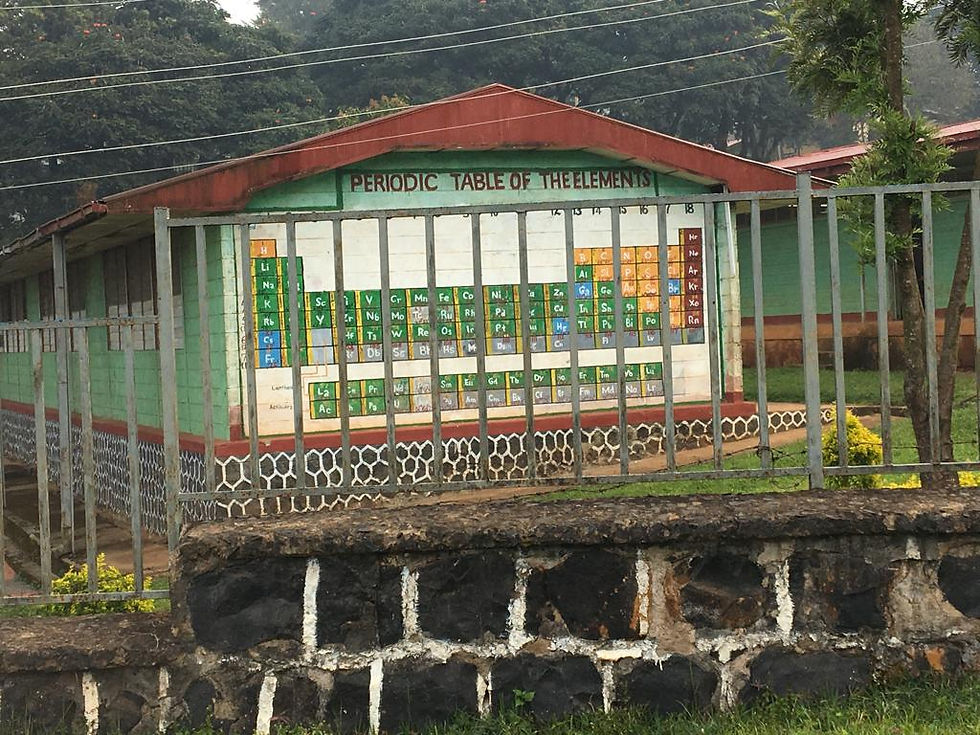
However, all these projects for water or farming lead nowhere if they are not supported for 20 years. We saw lots of pumps lying around, good only for the parts. Another time we saw a brand new tractor. But there is nothing you can do with such a machine in the current set up. Must be a project from some Rotary or Lions Club! The Chinese build roads. Infrastructure helps. They trade land and free labour to do it and supply all equipment. There is lots of criticism, but I think this actually is not bad. But you also wonder what happens to tribe culture if paved roads allow for more tourism.
So much for now. Thanks for your attention and all your support for the project, I will update you again soon!

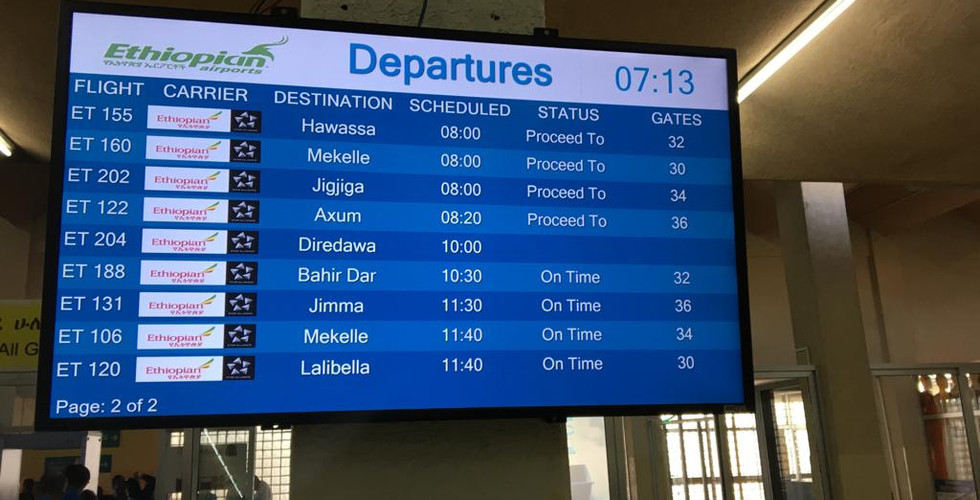

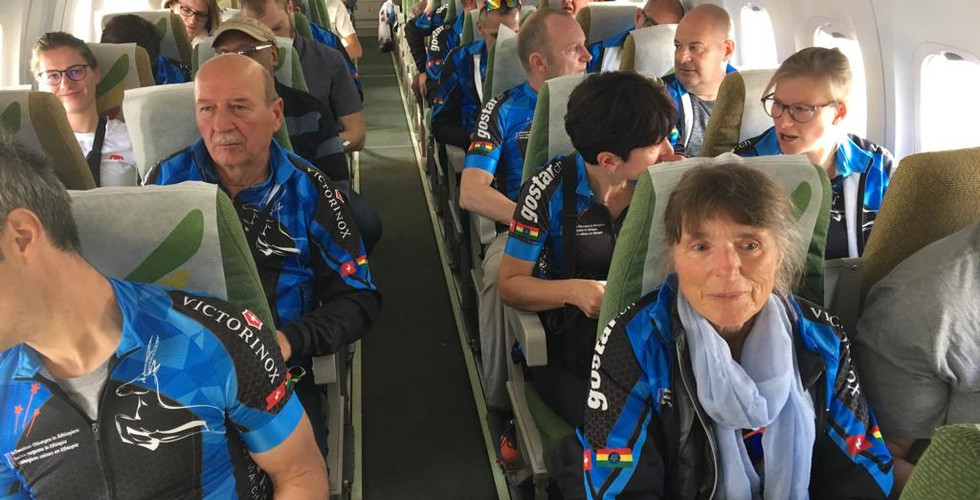

















Comments